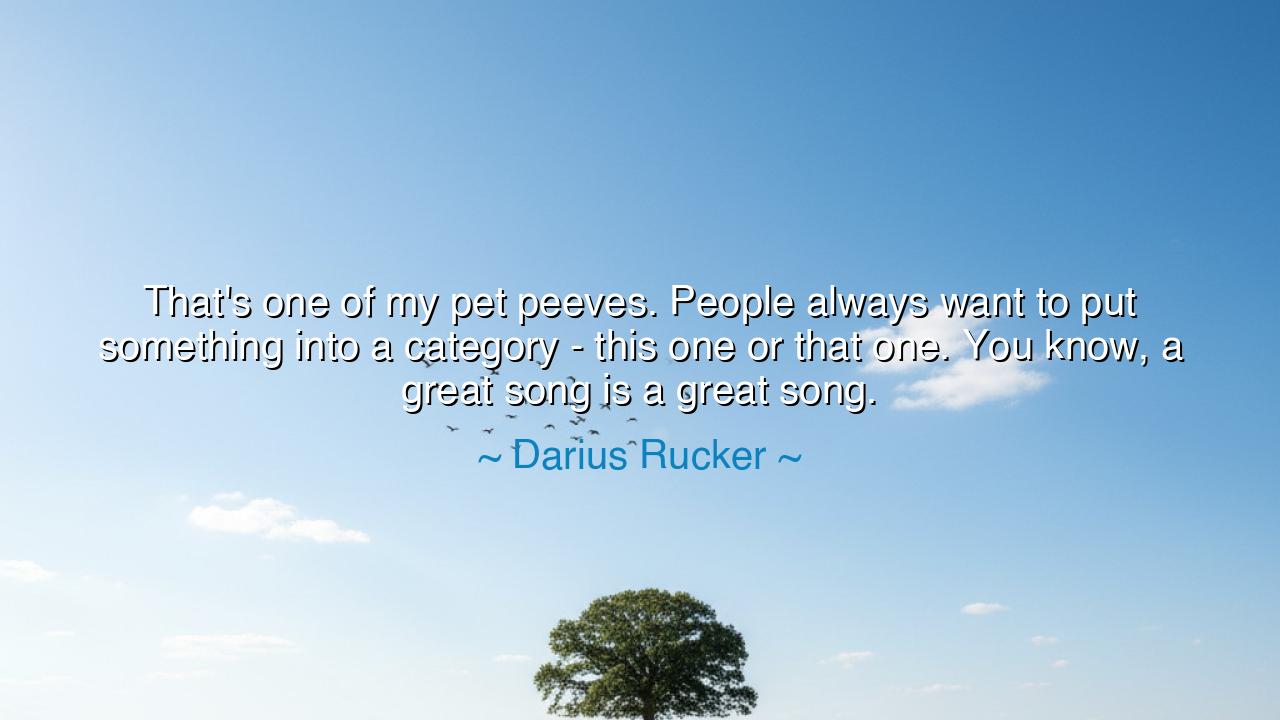
That's one of my pet peeves. People always want to put something
That's one of my pet peeves. People always want to put something into a category - this one or that one. You know, a great song is a great song.






Hear, O lovers of art and seekers of harmony, the words of Darius Rucker, who declared with fervent honesty: “That’s one of my pet peeves. People always want to put something into a category—this one or that one. You know, a great song is a great song.” These words, though spoken in the realm of music, resound with timeless truth about the human spirit: that we too often imprison beauty in labels, when in truth, beauty is meant to be free.
For the impulse to divide and categorize is strong in humankind. We label by genre, by race, by culture, by creed. We say: this belongs here, that belongs there. Yet in doing so, we risk blinding ourselves to the essence. A song, stripped of its labels, is vibration, is story, is emotion cast into sound. If it moves the soul, if it awakens tears or laughter, if it stirs the heart to remember or hope, then it is great, no matter what shelf the world would place it on.
The pet peeve of Rucker is not trivial; it is a lament for the narrowing of vision. For when the ear listens only through the filter of category—country or pop, sacred or secular—it misses the heart of the matter. True artistry breaks chains, it spills beyond boundaries, it refuses confinement. To demand that every creation fit neatly into a box is to deny the very nature of creation, which is to bring forth something new.
Consider, O listener, the tale of Beethoven, who in his time was told his works were too stormy, too unruly, neither classical enough nor wholly romantic. Yet his music endured, because it spoke directly to the soul, beyond the confines of category. Or recall the voice of Billie Holiday, whose songs were not merely jazz, nor blues, nor torch ballads, but vessels of raw emotion. The world tried to classify her, but her greatness lay precisely in her refusal to be pinned down.
The meaning of Rucker’s words is clear: a great song transcends boundaries. Its greatness lies not in the label attached to it, but in its ability to move human beings in their core. The child who hums it on the street, the lover who plays it in the dark, the mourner who clings to it in grief—all bear witness to its truth. To confine it in category is to diminish it; to embrace it without label is to let it breathe.
The lesson for you, O child of tomorrow, is this: resist the urge to confine what is beautiful to human-made boxes. Not only in music, but in people, in ideas, in cultures. Do not say, “This belongs here and not there.” Instead, ask: “Does this move the spirit? Does it carry truth? Does it awaken joy?” Judge not by the name it is given, but by the life it gives. For the soul knows no genres.
Practical action follows: when you encounter art, set aside the labels. Listen without prejudice, read without bias, gaze without preconception. Let your heart be the judge. And in life, when you meet people, do not confine them to categories of origin, profession, or appearance. Seek instead the greatness within them. In this way, you will honor both the art and the artist, both the song and the singer.
Therefore, remember Rucker’s wisdom: “A great song is a great song.” Do not bind beauty with chains of category. Let it be free, and in its freedom, it will reveal to you truths deeper than labels could ever contain. For greatness is not what we call it—it is what it awakens in the human heart.






AAdministratorAdministrator
Welcome, honored guests. Please leave a comment, we will respond soon